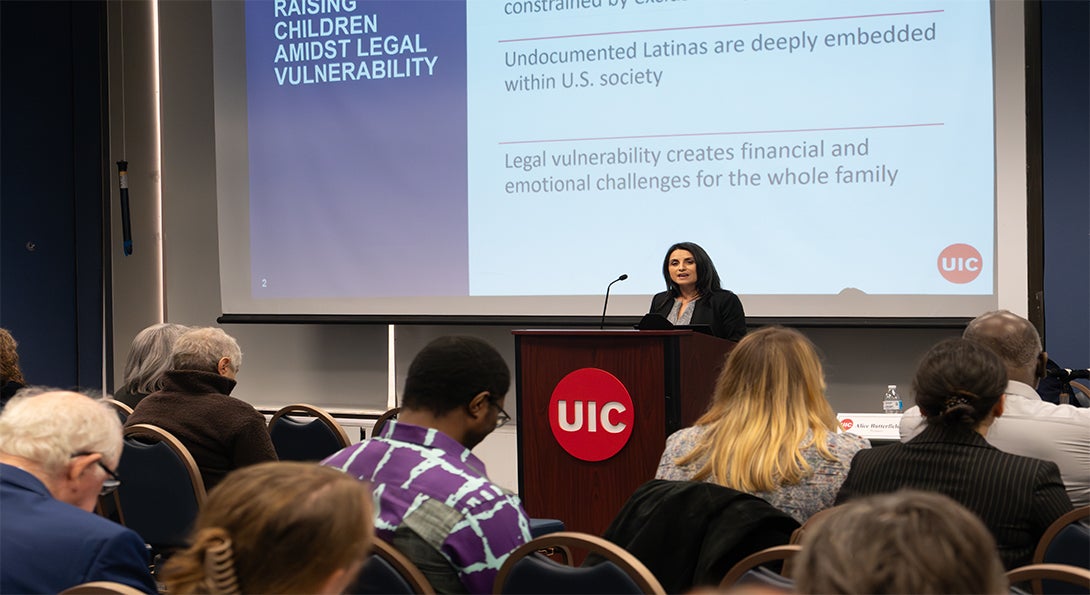Family Matters

Assistant Professor Daysi Diaz-Strong presents her work at the 29th Karen J. Honig Memorial Lecture
The Jane Addams College of Social Work hosted the 29th Karen J. Honig Memorial Lecture on March 19 with a faculty roundtable discussing “Supporting Parents to Strengthen Families.” Professor Sonya Leathers, Associate Professors Otima Doyle and Branden McLeod, and Assistant Professor Daysi Diaz-Strong comprised the panel, moderated by Professor Alice Butterfield.
Diaz-Strong’s immigrant background shapes her professional and research interests in education and immigration. Her research focuses on the educational and developmental trajectories of undocumented immigrants from Latin America. During her presentation, “There is No Option Other Than Strength: Immigrant Latina Mothers Raising Children Under Legal Vulnerability,” Diaz-Strong shared preliminary findings of her new study that is based on interviews with 60 Latina immigrant women living in Chicago’s suburbs.
In the United States, a segment of Latina immigrant women must navigate exclusionary immigrant laws while building their families and raising their children, said Diaz-Strong, PhD. Latinas who immigrate as adults often start their own families either right before or after immigrating to the U.S., meaning that from the beginning their family lives are fundamentally shaped and constrained by exclusionary immigration laws that limit their job opportunities, bar access to many social services, and generate fear and distress. Latina immigrants raise their children from the early years to adulthood while facing the burden of legal vulnerability.
“Latina immigrant women face many challenges in raising their children in the United States under the condition of legal vulnerability,” Diaz-Strong told the audience. “Limited job opportunities that constrain the family’s financial stability, fear and emotional distress from the potential of family separation, discrimination within institutions, including schools and healthcare settings, and challenges to sharing their culture with their children due to the inability to travel are just a few.”
As the director of the Behavioral Health Workforce Center (BHWC) at UIC, Sonya Leathers, PhD, is leading an initiative to increase access to high-quality mental health services for low-income children and adolescents across the state of Illinois. In her presentation, “Parent and Child Health Needs: Understanding Service Gaps and Building Capacity,” Leathers discussed efforts completed at the BHWC that focused on understanding and addressing the mental health needs of children and parents.
In a survey involving more than 500 participants, Leathers and her team discovered there is a high need for training staff in how to support and work with families with complex needs, as well as parents who struggle to parent children with behavior problems. In particular, mental health providers in Chicago reported that they were unlikely to work directly with parents.
Addressing parents' needs
To better address parents’ needs, the BHWC is focused on disseminating effective parenting interventions throughout the state. A pilot program developed over the past two years has provided training and implementation support for an evidence-based parenting intervention, Leathers said. She and her team have discovered significant benefits for parents and their children. However, hurdles exist, particularly to the intervention’s sustained use in the community-based settings where parents seek support, including policies related to billing for services and the lack of funding streams for community-based prevention services, she said.
“Issues affecting parents’ mental health have direct and indirect effects on children’s mental health... and children’s mental health needs also affect parents,” Leathers said. “Positive parenting practices provide long-term benefits for children’s emotional, behavioral, social, and academic wellbeing. Parenting interventions are the most effective treatment for behavioral problems and have also been shown to reduce children’s depression and decrease parents’ stress. So, dissemination of these interventions is critical to improve services and outcomes for children and families.”
Doyle and McLeod are the co-founders and co-directors of LEADR, the Lab for Empowerment and Advancement Through Dad-Driven Research, which was founded in 2022. LEADR partners with fathers and families to support the overall health and well-being of families in urban settings by engaging in father-focused research that is relevant and acceptable to fathers and families, themselves. LEADR focuses on families with the highest concentration of social and economic needs, examining the role of factors such as race, culture, economics, and other structural barriers that inform the unique and contextualized needs, strengths, and resiliencies of fathers, youth, and families.
“We’re committed to identifying and mitigating detrimental, unsupportive and oppressive policies and practices that impact youth, fathers, and their families to re-structure the world with supportive and effective policies and practices so that they will thrive,” said Doyle during her and McLeod’s presentation, “LEADR: Supporting Fathers to Strengthen Families.”
According to the Associated Press, President Donald Trump gained a larger share of Black and Latino voters than he did in 2020, when he lost to Democrat Joe Biden. McLeod and Doyle are leading a new study to explore the political engagement and voting activities among Black men in the United States.
“Why is this important?” McLeod asked. “Voting is a social determinant of health and a basic human right. Individuals and communities who vote are better off in important indicators of well-being.”
Doyle’s current work focuses on developing father-focused preventive interventions for Black adolescents at risk for depression and aggression and incorporates fathers, families and community stakeholders in intervention development, implementation, and testing.
“Black fathers play a pivotal role in preventing and managing behavioral health issues among youth,” Doyle said. “They are integral in the lives of male adolescents who play competitive, team-based, contact sports.” Through her research, Doyle has documented Black fathers’ interest in sports-based, mental health programs for their sons. The goal, she said, is to adapt and test the feasibility of a sports-based mental health literacy program for Black male high school athletes in the United States, their parents, and their coaches.
Named for a 1986 Jane Addams College of Social Work graduate, the Karen J. Honig Memorial Lecture was established by her family and friends to honor her memory and focus on commitment to inner-city children and youth, and their families.